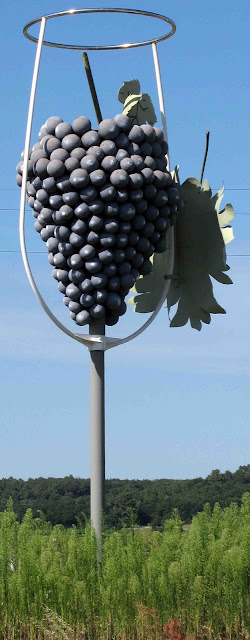Breton Avis de Vin Fort Bourgueil (AOC) 2017, 12.5%, €21.95 64 Wine Dublin, Bradley’s of Cork, Greenman Dublin, Le Caveau Kilkenny
Immediately north east of the confluence of the two rivers (Loire & its tributary Vienne) you come to Bourgueil and appellations named after that town and its close neighbour St Nicolas de Bourgueil. Wine is so important here that there is a huge wine bottle outside the church in St Nicolas and a large bunch of grapes is a centrepoint on at least one roundabout. The reds here and in Chinon, across the Loire to the south, are often excellent. As the World Atlas of Wine declares: "For its quality, it is absurdly undervalued".
Cabernet Franc is the red grape in these parts and this is a slightly unusual example, made in the style of a Clairet (indicated on the label), a cross between a rosé and a red.
Colour though is dark enough, mid to dark ruby. Aromas are of fresh red fruit. It is undeniably fresh and light on the palate, easy-drinking and something of a thirst quencher. Barely a trace of tannin, just enough to dry the lips a bit - and a pleasant finish to boot. This vin de soif is Highly Recommended for that picnic or a sneaky glass at lunch before returning to the daily grind.
A husband-and-wife operation in the Loire Valley, Catherine and Pierre Breton, based in the commune of Restigné, have recently celebrated their 30th vintage and have built their reputation on making pure Cabernet Francs from Bourgueil and neighbouring Chinon using biodynamic viticulture and vinification.
 The vineyards see ultra-intense organic care, no mean feat in this northerly clime though by no means unique either; they avoid chemical fertilisers and weed killers, restrict yields and harvest by hand. The Bretons use indigenous yeasts and their desire for “natural” winemaking comes through strong in their resistance to the use of sulphites, with typically just 10 mg/l added at bottling to many cuvées, although some are bottled without any sulphites at all. And they are bottled unfiltered. This one is raised in Grenier wood barrels until spring, bottled in April with minimal sulphur. There was a little bit of sediment in this bottle, nothing to worry about but you may prefer to decant.
The vineyards see ultra-intense organic care, no mean feat in this northerly clime though by no means unique either; they avoid chemical fertilisers and weed killers, restrict yields and harvest by hand. The Bretons use indigenous yeasts and their desire for “natural” winemaking comes through strong in their resistance to the use of sulphites, with typically just 10 mg/l added at bottling to many cuvées, although some are bottled without any sulphites at all. And they are bottled unfiltered. This one is raised in Grenier wood barrels until spring, bottled in April with minimal sulphur. There was a little bit of sediment in this bottle, nothing to worry about but you may prefer to decant.
The wine’s name is a reference to the maritime warning “Avis de Vent Fort” (meaning strong winds are in the forecast), and is a play on words to evoke the idea that if the weather is bad, one should sail back to shore and have a glass of wine instead.













































